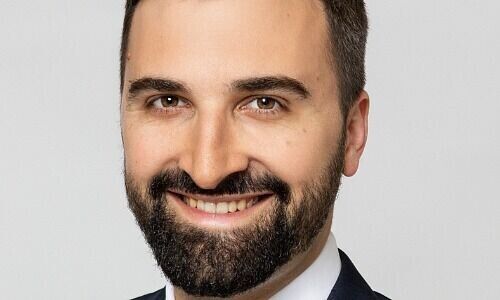Olivier Kessler: «Are We in the Midst of a Zeitenwende?»
It seems more and more people in the West are coming to realize that we are on the wrong track. The signs are mounting that we may be at the beginning of a turning point. This impression, at least, could be drawn from recent global developments, Olivier Kessler writes in his contribution to finews.first.
In this section, authors comment on economic and financial topics.
The decades since the fall of the Berlin Wall have been, from a freedom perspective, largely disheartening. Since then, the West has ideologically drifted far from its foundations. Up to that point, it had adhered more or less steadfastly to the principles for which it was admired worldwide: individual freedom, private property, free enterprise, endless opportunities, market economy, and freedom of expression.
However, soon after the socialist competition behind the Iron Curtain collapsed, this commitment began to wane. Gradually, paternalism, overregulation, paternalistic governance, dirigisme, planned economic elements, state control, and surveillance crept in.
«Only fragments of the Free World remain»
Genuine freedom has become a rare commodity in Western countries. On paper, these countries may still appear freer than others, such as the BRICS nations, let alone Cuba, Venezuela, or North Korea. Yet the absolute level of freedom has been systematically eroded over the past decades – slice by slice.
Today, only shattered fragments of the Free World remain. The state has seized control over virtually all areas of life, disempowering individuals. Values like personal responsibility, voluntary solidarity, frugality, and private provision have eroded.
«A bloated state creates no prosperity»
Then, out of nowhere, libertarian presidential candidate Javier Milei won Argentina's election, sending shockwaves across the globe. About a century ago, Argentina was one of the world's wealthiest nations, as the saying «rich as an Argentinian» reminds us.
But socialist policies thoroughly destroyed it, proving once again that a bloated state does not create wealth but destroys it. If Western nations continue down the misguided path they embarked upon after the fall of the Berlin Wall, this would be the tragic fate of all of them.
Milei, a proponent of the Austrian School of Economics, inspired by thinkers like Ludwig von Mises and Murray Rothbard, understands that the state is not the solution but the problem. Since taking office, he has moved swiftly to free Argentina from the burden of excessive regulation and fiscal greed. One of his first acts in office was to reduce the number of ministries from 21 to 9. Under Milei, Argentina's budget has been balanced for the first time in years, thanks to a resolute austerity program.
«Javier Milei's deregulation agenda is working»
This shift has eliminated the need to fund previously high government expenditures by «printing money» through the central bank, which has curbed rampant hyperinflation. From a monthly rate of 25.5 percent in December 2023, inflation dropped to «just» 4.6 percent by June.
Milei's deregulation agenda is delivering results. One example among many: In December 2023, he eliminated rent controls and dismantled housing regulations. As a result, the supply of rental housing surged by an impressive 212 percent year-over-year, while average rental prices fell by 26.6 percent.
«Do nothing and let the statists continue?»
What Argentina do we in the West take as a model? The one of the past decades, which failed spectacularly and led to poverty and misery? If so, we need to do nothing – just let statists in all parties continue their course.
Or do we look to post-2023 Argentina as a model, aiming to become the freest country in the world by closing a significant portion of government institutions, dismantling harmful regulations, slashing taxes, and instilling new hope in its population?
It seems more and more people in the West are waking up to the realization that we are on the wrong path. Signs are increasing that we may be at the dawn of a turning point. At least this impression could be gained from recent global developments:
- In the US, Elon Musk and Vivek Ramaswamy are planning to lead the new Department of Government Efficiency (DOGE), cutting $2 trillion in government spending.
- In Germany, the eco-socialist coalition government collapsed after angering many Germans with its policy of excessive state intervention and a reckless deindustrialization agenda. Will this lead to a reversal of this ideological misstep and possibly a new «economic miracle»?
- Liechtenstein abolished public broadcasting through a referendum, implementing a more liberal media policy.
Clearly, enormous challenges lie ahead, and there is still much work to be done. Yet the signs are accumulating that the pendulum, which has swung for decades toward state expansion, overregulation, and interventionism, might finally be starting to swing back.
Olivier Kessler is a Swiss publicist and economist. He studied International Affairs & Governance and Economic Journalism at the University of St. Gallen. From 2008 to 2012, he was Secretary of the Swiss People's Party (SVP) in the canton of Schwyz. Subsequently, he worked for several public affairs and media companies. In 2016, he became Deputy Director of the Liberal Institute and has served as its Director since 2020. He has left the SVP.
Previous texts by: Rudi Bogni, Rolf Banz, Werner Vogt, Walter Wittmann, Alfred Mettler, Robert Holzach, Craig Murray, David Zollinger, Arthur Bolliger, Beat Kappeler, Chris Rowe, Stefan Gerlach, Nuno Fernandes, Richard Egger, Dieter Ruloff, Marco Bargel, Steve Hanke, Urs Schoettli, Maurice Pedergnana, Stefan Kreuzkamp, Oliver Bussmann, Michael Benz, Albert Steck, Martin Dahinden, Thomas Fedier, Alfred Mettler, Brigitte Strebel, Mirjam Staub-Bisang, Kim Iskyan, Stephen Dover, Denise Kenyon-Rouvinez, Christian Dreyer, Kinan Khadam-Al-Jame, Robert Hemmi, Anton Affentranger, Yves Mirabaud, Hans-Martin Kraus, Gérard Guerdat, Mario Bassi, Stephen Thariyan, Dan Steinbock, Rino Borini, Bert Flossbach, Michael Hasenstab, Guido Schilling, Werner E. Rutsch, Dorte Bech Vizard, Maya Bhandari, Jean Tirole, Hans Jakob Roth, Marco Martinelli, Thomas Sutter, Tom King, Werner Peyer, Thomas Kupfer, Peter Kurer, Arturo Bris, Frédéric Papp, James Syme, Dennis Larsen, Bernd Kramer, Armin Jans, Nicolas Roth, Hans Ulrich Jost, Patrick Hunger, Fabrizio Quirighetti, Claire Shaw, Peter Fanconi, Alex Wolf, Dan Steinbock, Patrick Scheurle, Sandro Occhilupo, Will Ballard, Nicholas Yeo, Claude-Alain Margelisch, Jean-François Hirschel, Jens Pongratz, Samuel Gerber, Philipp Weckherlin, Anne Richards, Antoni Trenchev, Benoit Barbereau, Pascal R. Bersier, Shaul Lifshitz, Ana Botín, Martin Gilbert, Jesper Koll, Ingo Rauser, Carlo Capaul, Markus Winkler, Thomas Steinemann, Christina Böck, Guillaume Compeyron, Miro Zivkovic, Alexander F. Wagner, Eric Heymann, Christoph Sax, Felix Brem, Jochen Möbert, Jacques-Aurélien Marcireau, Ursula Finsterwald, Michel Longhini, Stefan Blum, Nicolas Ramelet, Søren Bjønness, Gilles Prince, Shanu Hinduja, Salman Ahmed, Peter van der Welle, Ken Orchard, Christian Gast, Jürgen Braunstein, Jeffrey Vögeli, Fiona Frick, Stefan Schneider, Matthias Hunn, Andreas Vetsch, Mark Hawtin, Fabiana Fedeli, Kim Fournais, Carole Millet, Swetha Ramachandran, Thomas Stucki, Neil Shearing, Tom Naratil, Oliver Berger, Robert Sharps, Tobias Müller, Florian Wicki, Jean Keller, Niels Lan Doky, Johnny El Hachem, Judith Basad, Katharina Bart, Thorsten Polleit, Peter Schmid, Karam Hinduja, Zsolt Kohalmi, Raphaël Surber, Santosh Brivio, Mark Urquhart, Olivier Kessler, Bruno Capone, Peter Hody, Agniszka Walorska, Thomas Müller, Ebrahim Attarzadeh, Marcel Hostettler, Hui Zhang, Angela Agostini, Guy de Blonay, Tatjana Greil Castro, Jean-Baptiste Berthon, Dietrich Grönemeyer, Mobeen Tahir, Didier Saint-Georges, Serge Tabachnik, Vega Ibanez, David Folkerts-Landau, Michael Welti, Mihkel Vitsur, Roman Balzan, Todd Saligman, Stuart Dunbar, Carina Schaurte, Birte Orth-Freese, Gun Woo, Lamara von Albertini, Ramon Vogt, Andrea Hoffmann, Niccolò Garzelli, Darren Williams, Benjamin Böhner, Mike Judith, Jared Cook, Henk Grootveld, Roman Gaus, Nicolas Faller, Anna Stünzi, Thomas Höhne-Sparborth, Fabrizio Pagani, Guy de Blonay, Jan Boudewijns, Sean Hagerty, Alina Donets, Sébastien Galy, Roman von Ah, Fernando Fernández, Georg von Wyss, Stefan Bannwart, Andreas Britt, Frédéric Leroux, Nick Platjouw, Rolando Grandi, Philipp Kaupke, Gérard Piasko, Brad Slingerlend, Dieter Wermuth, Grégoire Bordier, Gianluca Gerosa, Michael Bornhäusser, Christine Houston, Manuel Romera Robles, Fabian Käslin, Claudia Kraaz, Marco Huwiler, Lukas Zihlmann, Sherif Mamdouh, Harald Preissler, Taimur Hyat, Philipp Cottier, Andreas Herrmann, Camille Vial, Marcus Hüttinger, Serge Beck, Alannah Beer, Stéphane Monier, Ashley Semmens, Lars Jaeger, Shanna Strauss-Frank, Bertrand Binggeli, Marionna Wegenstein, George Muzinich, Jian Shi Cortesi, Razan Nasser, Nicolas Forest, Jörg Rütschi, Reto Jauch, Bernardo Brunschwiler, Charles-Henry Monchau, Nicolas Ramelet, Ha Duong, Teodoro Cocca, Jan Brzezek, Nicolas Mousset, Beat Weiss, Pascal Mischler, Andrew Isbester, Konrad Hummler, Jan Beckers, Martin Velten, Katharine Neiss, Claude Baumann, Daniel Roarty, Kubilaqy Yalcin, Robert Almeida, Karin M. Klossek, Marc Taverner, Charlie T. Munger, Daniel Kobler, Patrick Stauber, Anna Rosenberg, Judith Wallenstein, Adriano Lucatelli, Daniel Goleman, Val Olson, Brice Prunas, Frances Weir, Luis Maldonado, Francesco Magistra, Nadège Lesueur-Pène, Massimo Pedrazzini, Eric Sarasin, Dina Ting, Christopher Gannatti, Shaniel Ramjee, Mihkel Vitsur, Nannette Hechler-Fayd'herbe, Ralph Ebert, Mark Denham, Francesco Mandalà, Mariolina Esposito, Maryann Umoren Selfe, Dominique Gerster, Christian Kälin, Nadège Dufossé, Benjamin Melman, Brigitte Kaps, Florin Baeriswyl, Marc Reinhardt, Thomas Holderegger, Beat Wittmann, Bruno Cavalier, Gary Burnison, Louise Curran, Adrian Cox, Philip Adler, Serge Fehr, Marc Lussy, Axel Brosey, Colin Vidal, Vivien Jain, Ralf Zellweger, Maria Vassalou, Nico Fiore, Gary Burnison, Thomas Signer, Brigitte Kaps, Andreas Ita, Jacques-Aurélien Marcireau, Leon Curti, Remo Badertscher, and Alexis Marinof.



























